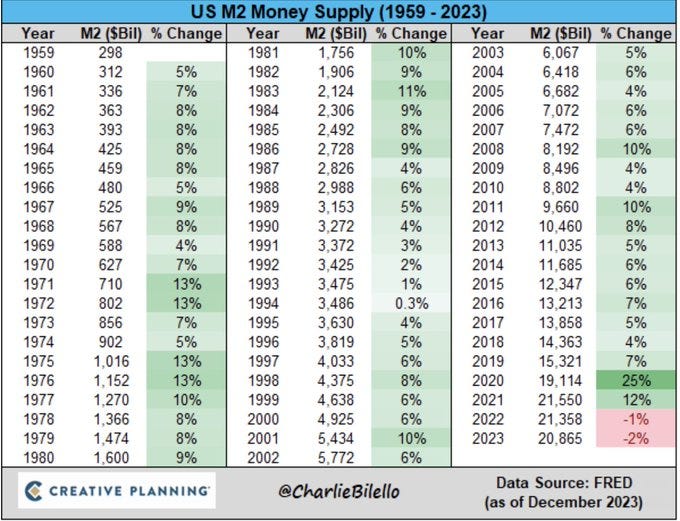Today's Must-Reads - 31 January 2024
A selection of the latest news, studies, reports and articles
I spend a lot of time each day gathering together new information and fascinating articles. I then pick one or two of the most interesting topics and write about them. However, that leaves a lot of missed out information that I’m not sharing.
Below is a summary of all the latest articles and information that I’ve found. This is a slimmed down version for all readers but is usually for paid subscribers only.
Support this newsletter by becoming a paid subscriber and join the thousands of readers who stay informed about what is really going on in the world and why.
Climate Change
Trillions Spent on ‘Climate Change’ Based on Faulty Temperature Data, Climate Experts Say. Meteorologist finds 96 percent of NOAA temperature stations located in ‘urban heat islands,’ including next to exhaust fans and on ‘blistering-hot rooftops.’ “The few stations that are left that are not biased because they are, for example, outside of town in a field and are an agricultural research station that’s been around for 100 years ... their data gets completely swamped by the much larger set of biased data. There’s no way you can adjust that out.”
Covid Mandates & Lockdowns
Africa needs an inquiry into Covid-19 mistakes. An accounting must be made of the mistakes, so that such an inept response driven by wealthy nations and foisted onto Africa never takes place again. With a median age of lower than 20, Africa was always likely to have a low death rate from Covid. This is not an indication of success, but instead of the catastrophe that took place when assuming that Covid-19 would be an equal threat in Africa as it may have been elsewhere. The first mistake came with lockdowns which had been trialled in Freetown and Monrovia during the Ebola epidemic. Esteemed groups such as Doctors Without Borders had counselled against this move then, and subsequent academic research deemed that they had been ineffective – as impossible to maintain in environments where the informal economy is so important.
Economy/Energy/Finance
The Real-Estate Downturn Comes for America’s Premier Office Towers. The highest quality office buildings have had much better success navigating the industry’s turmoil. Now, even premier towers are starting to wobble. Rents at the highest-end buildings have been falling, while the rate of leasing has been slowing. Tenants have become more sensitive to costs in a world of higher interest rates and lingering concerns about a possible economic slowdown, market participants say. Owners of the most elite buildings escaped this fate for a while by convincing the market they had created a new class of office tower—one that surpassed the traditional Class A building at the top of the pecking order.
Our foreign debt time bomb. An explosion threatens when interest rates rise. Australia’s net foreign debt has ballooned to $1.2 trillion as of September 30. This amounts to about 50 per cent of GDP. Gross debt is now $2.8 trillion, about 110 per cent of output. These are high ratios by international standards. The risk is that one day, global investors might baulk at adding to Australia’s foreign debt. Australia would face an economic crisis if foreigners stopped sending their savings because, by the count of the ABS, about $542 billion, or 19 per cent of gross debt has a maturity of less than 90 days. While this figure is bloated by derivatives, it highlights the vast amount of debt that needs to be renegotiated at acceptable rates every three months for Australia’s economy to function.
China stocks fall despite expanded short-selling curbs. Chinese share prices declined Monday even as authorities imposed new restrictions to curb short-selling, a move that appears to have done little to ease investor concern over China's economic prospects. Effective Monday, the China Securities Regulatory Commission fully suspended the lending of restricted shares, which cannot be sold on the market for a specific period but previously could be lent for short-selling. But China's real estate slump continues to create uncertainty over Asia's biggest economy. In a new twist, a Hong Kong court on Monday ordered debt-laden property developer China Evergrande Group to be wound up.
UPS announces 12,000 job cuts, says package volume slipped last quarter. UPS
fell short of Wall Street revenue estimates Tuesday, reporting drops in shipping volume, both internationally and domestically, in its fourth-quarter earnings report. The company also announced 12,000 layoffs as part of an effort to align resources in 2024. The workforce reductions will save the company about $1 billion in costs, CEO Carol Tomé said on a company earnings call.
IMF raises Russia growth outlook as war boosts economy. Gross domestic product is forecast to rise 2.6 per cent this year, more than double the pace the IMF predicted as recently as October, and slightly slower than the 3 per cent expansion estimated for 2023. The Russian upgrade, by 1.5 percentage points, is the largest for any economy featured in an update to the fund’s World Economic Outlook, released on Tuesday. The figures will raise fresh questions over the effectiveness of multiple rounds of western sanctions aimed at depressing the fiscal revenues harvested by the Kremlin to finance its war in Ukraine.
A great chart to see what an anomaly the last few years have been when it comes to US M2 money supply.
Health
Medicine Has Been Fully Militarized. By early-to-mid 2020, it became obvious to those paying attention that the Covid “response,” while promoted as a medical initiative, was in fact a military operation. Top-down diktats on how to manage Covid patients were handed down to physicians from high above, and these were enforced with a militaristic rigidity unseen in doctors’ professional lifetimes. The mandated protocols made no sense. They ignored fundamental tenets of both sound medical practice and medical ethics. They shamelessly lied about well-known, tried-and-true medicines that were known to be safe and appeared to work. The protocols killed people.
Politics
North Korea now using AI in nuclear program. North Korea has been developing artificial intelligence across various sectors, including in military technology and programs that safeguard nuclear reactors, which could create international threats, according to a new report. The authoritarian regime has used AI to develop wargame simulations and has collaborated with Chinese tech researchers, according to a report by 38 North, a publication for policy and technical analysis of North Korean affairs. The AI advancements and foreign collaboration could lead to sanction violations and leaked information, the report stated.
Iran on high alert as Biden mulls response to killing of US servicemen. Iran has told the US via intermediaries that if it strikes Iranian soil directly, Tehran will itself hit back at American assets in the Middle East, drawing the two sides into a direct conflict. The warning comes as Iran waits on high alert to see how Joe Biden responds to the death of three US servicemen deemed by Washington to have been killed by a Tehran-backed militia based in Syria. US bases in Syria and Iraq have suffered more than 160 attacks of varying seriousness since Hamas’s 7 October assault on Israel.
France’s farmer protests are a revolt against the City. Politicians are perceived as representing an establishment which is far more interested in looking after super-rich industrialists living in gold-stoned Haussmann mansions, rather than rural workers from the provinces. Macron’s policies have encouraged fierce competition from abroad, they argue, setting up a life-and-death struggle for thousands of farmers. Their country used to take huge pride in its own produce, before Gallic smallholdings were swallowed up by multinational food conglomerates.
Science
Dark matter could be gently wobbling space-time around us — and scientists may finally know how to detect it. A new paper suggests we may finally be able to uncover the identity of dark matter using the same technology that detects ripples in space-time known as gravitational waves. The wave properties of dark matter could lead to unexpected behaviors. In particular, recent theoretical studies suggest that the density of dark matter within a galactic halo should undergo random changes, jostling entire galaxies and potentially leaving subtle clues about dark matter's makeup.
Technology
From nanny state to Big Brother. Using facial-recognition software to stop underage boozing is the thin end of an authoritarian wedge. Robots might not be about to take over the world anytime soon, but it would be nice if politicians stopped giving them so many jobs to do. Last week, it was reported that the UK government wants to install facial-recognition cameras at supermarket checkouts to stop under-18s from buying alcohol. The problem with this proposal is that it is expressly giving AI a role in upholding the law. And once we allow algorithms to enforce legal requirements, things can only get worse from there. The next step could well be digital IDs – that catch-all solution that politicians of all parties just can’t seem to quit.
OpenAI says mysterious chat histories resulted from account takeover. ChatGPT is leaking private conversations that include login credentials and other personal details of unrelated users, screenshots submitted by an Ars reader on Monday indicated. Two of the seven screenshots the reader submitted stood out in particular. Both contained multiple pairs of usernames and passwords that appeared to be connected to a support system used by employees of a pharmacy prescription drug portal.
Vaccines
Cryptic vaccine-associated adverse events: The critical need for a new vaccine safety surveillance paradigm to improve public trust in vaccines. Some vaccine reactions are not immediately obvious, or are even clinically “silent” or cryptic, making them challenging to identify and link directly to a vaccine. It is critical to be vigilant about rare, silent, or subtle reactions. Public health agencies and healthcare providers can play a much more favorable and vital role in establishing vaccine trust by enlarging the current vaccine safety paradigm, and in publishing and communicating, in full, these risks and benefits transparently to the public.







Thanks for opening up this post to all readers. I miss reading you on a daily basis...
He's blaming the military for COVID when it's NIH and CDC, which was 'run like the military'.
Ah, yes, bureaucratic dictatorship... but not in fact the military.
In fact it wasn't soldiers, but doctors, like the good Dr. Clayton himself.